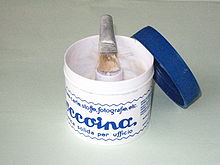Pelican oil
Pelikanol was an adhesive made from potato starch for gluing paper, first marketed in 1904 by today's Pelikan AG . The white paste was applied with a brush, later with a small plastic spatula (which stood in the water in a small side compartment in the round tin) and its chemical composition is most likely made of starch using the newer generation of Pritt glue stick, to compare.
According to Pelikan AG, declining sales figures and new legal provisions that no longer allowed the typical marzipan scent led to the product being discontinued in the 1990s.
A comparable, if not the same, paper glue has been imported from Italy since 1927 under the name “Coccoina”. It is sold in the classic tin can, which was used in a similar form by Pelikan until the middle of the 20th century. This glue also has the typical bitter almond scent.
Cultural reception
- The folk singer Karl Valentin explains in his dialogue “In the zoological garden” to his partner when they asked what the “little white bastards” are lying around in the pelicans' cages: “That is the garbage from the pelicans, the pelican oil, the is then filled into tubes and costs 30 pfennigs! "
- In the television series A Heart and a Soul , in episode 3 “Visit from the Eastern Zone”, Alfred Tetzlaff, as evidently evident from the dialogue, sticks open letters under steam with pelican oil.
- Pelikanol is also the title of a song by the band Einstürzende Neubauten .
credentials
- ^ Karl Valentin: Monologs and Dialogues, Vol. 1 of Collected Works, anniversary edition, Munich, Piper-Verlag 1981, ISBN 3-492-02720-2 , page 130

